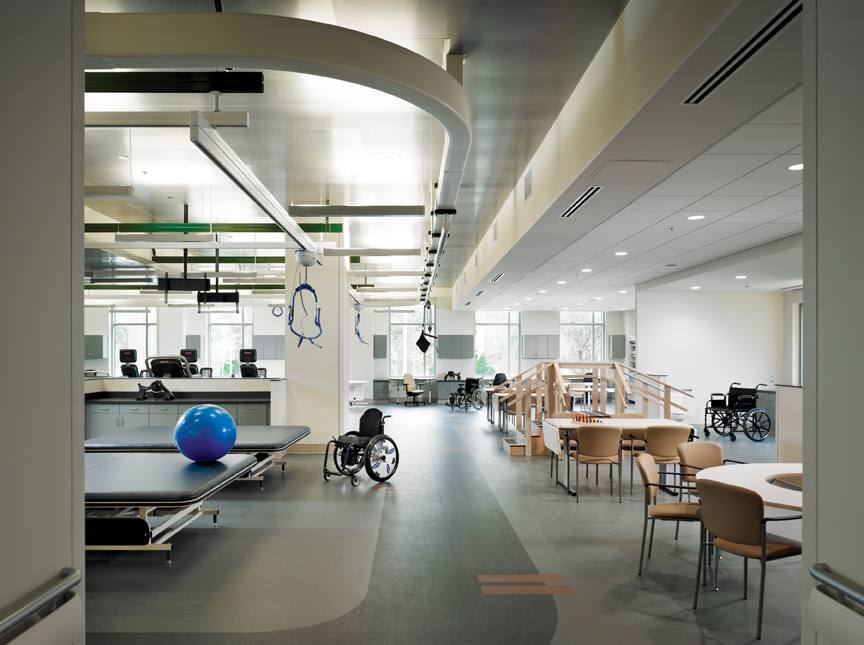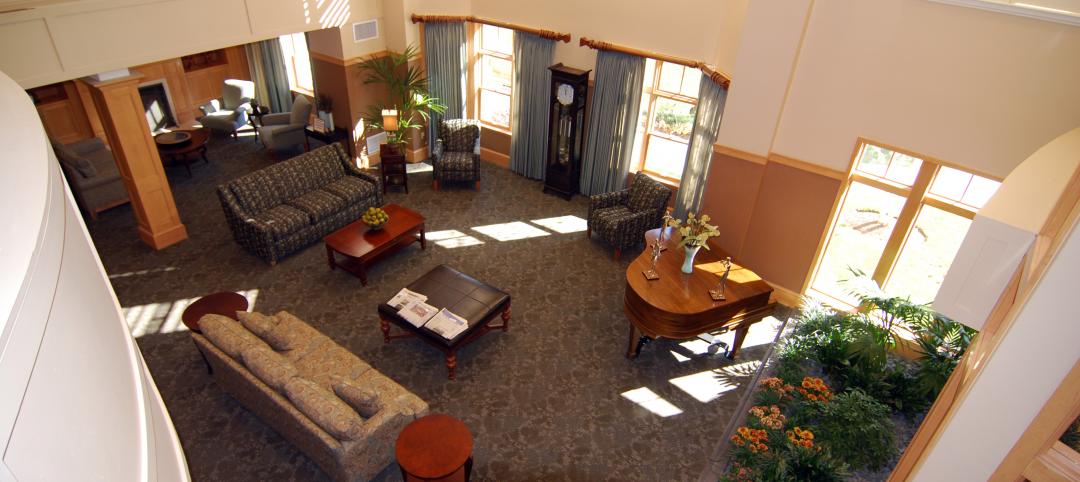2012 Building Team Awards
Gold Award
Since the early 2000s, the U.S. Department of Veterans Affairs has treated more than 200,000 Iraq- and Afghanistan-war veterans for post-traumatic stress disorder. The rate of traumatic brain injury (TBI) among U.S. forces has risen dramatically in the last decade as well, from 10,963 cases in all of 2000 to 30,380 just in the fourth quarter of 2011.
Audie L. Murphy VA Hospital in San Antonio, Texas, named after the most decorated soldier of World War II, provides a place for this dramatically increasing number of wounded veterans to receive care. The Building Team—prime contractor Robins & Morton and joint venture design firms SmithGroupJJR and Marmon Mok—faced complicated site logistics and security restrictions, but still managed to come in under budget and produce a facility that meets the physical and psychological needs of the veterans it serves.
This hospital was the VA’s first project constructed under the so-called “Integrated Design and Construct” method, which teams the contractor with the architect and owner early in the construction process. The Building Team credits this collaboration with the facility’s month-early completion and $3.75 million cost savings. Although the project was not required to be LEED-certified, the team still implemented high-level sustainability.
At the project’s core were the hospital’s patients: veterans recuperating from multiple traumatic injuries, often including limb loss and TBI. The “Planetree” principle—which seeks to create a healing environment inspired by nature—was employed throughout the facility’s design.
Because many TBI patients are extremely sensitive to light and noise, the Building Team used indirect and accent lighting and equipped each bed with controls so every patient can individually adjust the levels. All windows diffuse natural light and are equipped with blackout shades. Working with acoustic noise consultants, the team used low-pressure diffusers and air ducts to minimize the sound of air rushing through the HVAC system.
The Building Team went beyond standard ADA requirements and handicap-accessibility considerations to incorporate tools that help patients rehabilitate. The facility’s physical therapy gymnasium is used to work on remobilization in everyday scenarios, such as getting around the kitchen and bathroom and walking up and down stairs. Tracks for patient lift systems run along the ceilings throughout the facility to allow patients to walk while tethered, improving their balance, strength, and autonomy.
The GAIT Study room features a high-tech flooring system that measures the pressure points and angles with which a patient walks, runs, and jumps to assess whether correction is needed. The VA was also able to use a portion of the project’s $3.75 million cost savings to install a terrain park in the building’s center courtyard that functions as a physical therapy tool, with pull-up bars, steps, and paths of different surfaces.
“It’s one thing to say that you saved money, but to get a clear amenity out of it is a sign of a great Building Team,” said Tim Brown, AIA, of Tim Brown Architecture and associate professor at IIT’s College of Architecture, Chicago.
Hurdles posed by site logistics were handled quickly and efficiently. The laydown area and construction-employee parking lot were a full mile from the job site, requiring bussing workers to and from every day and night. Only one delivery truck could be on site at a time and every piece of material had to be scheduled in advance.
Project summary
GOLD AWARD
Audie L. Murphy VA Polytrauma Rehabilitation Center
San Antonio, TexasBuilding Team
Submitting entity: Robins & Morton (prime contractor)
Owner/developer: U.S. Department of Veterans Affairs
Architect: SmithGroupJJR | Marmon Mok Joint VentureGeneral Information
Project size: 84,000 sf
Construction cost: $39.5 million
Construction time: August 2009 to July 2011
Delivery method: Integrated design and construct
Phase one of the project included some work underneath the hospital’s existing parking lot, which meant that, for six weeks, Robins & Morton had to schedule work during nights and weekends to eliminate disruption to the hospital campus. Moreover, when the team tried to tie in the existing hospital to the new facility, it discovered that the 40-year-old building’s precast was falling down. The contractor had to remediate this problem while making sure that the new structure didn’t look like an add-on.
The Building Team’s commitment to veterans was paramount throughout the project. When, arguably for security reasons, the VA wanted to put up an Internet firewall, the team, knowing how important access to social media via laptops and mobile devices is to the new generation of veterans, fought for and got access to the Web for patients.
Robins & Morton also exceeded its goals for construction subcontracts granted to small veteran-owned businesses, awarding 17% to them. It also granted 10% to service-disabled veteran-owned small businesses, 6% to small disadvantaged businesses, 5% to women-owned small businesses, 41% to small business enterprises and 21% to HubZone small business.
Building Team Awards judge Terry Fielden, LEED AP BD+C, director of K-12 Education at International Contractors Inc., said he was impressed with the way the design came to fruition: “There was a lot of collaboration, especially with the veterans’ needs in mind.” BD+C
--
Click here to view exclusive video interviews of the 2012 Building Team Awards judges explaining their selection.
Related Stories
| Feb 10, 2012
Task force addresses questions regarding visually graded Southern Pine lumber
Answers address transition issues, how to obtain similar load-carrying capabilities, and why only some grades and sizes are affected at this time.
| Feb 10, 2012
Atlanta Housing Authority taps Johnson Controls to improve public housing efficiency
Energy-efficiency program to improve 13 senior residential care facilities and save nearly $18 million.
| Feb 10, 2012
Besculides joins New York Office of Perkins Eastman as associate principal
Besculides joins with more than 17 years’ experience in design, business development, and account management for the government, healthcare, and corporate practice areas with a particular focus on the financial and media sectors.
| Feb 10, 2012
Mortenson Construction research identifies healthcare industry and facility design trends
The 2012 Mortenson Construction Healthcare Industry Study includes insights and perspectives regarding government program concerns, the importance of lean operations, flexible facility design, project delivery trends, improving patient experience, and evidence-based design.
| Feb 10, 2012
LAX Central Utility Plant project tops out
Construction workers placed the final structural steel beam atop the Plant, which was designed with strict seismic criteria to help protect the facility and airport utilities during an earthquake.
| Feb 8, 2012
Nauset completes addition and renovation for Winchester senior living community
Theater, library, fitness center, and bistro enhance facility.
| Feb 8, 2012
Mega-malls expanding internationally
Historically, malls have always been the icons of America – the first mall ever was built in Minneapolis in 1956.
| Feb 8, 2012
World’s tallest solar PV-installation
The solar array is at the elevation of 737 feet, making the building the tallest in the world with a solar PV-installation on its roof.
| Feb 7, 2012
AIA introduces seven new contract documents to Documents-On-Demand service??
AIA Contract Documents are widely-used standard form contracts among the building industry to support construction and design projects.
| Feb 7, 2012
Data center construction boom driven by healthcare and technology
The study includes insight and perspective regarding current investment plans of stakeholders, potential challenges to the data center boom, data center efficiency levels, the impact of new designs and technologies, and delivery methods.
















